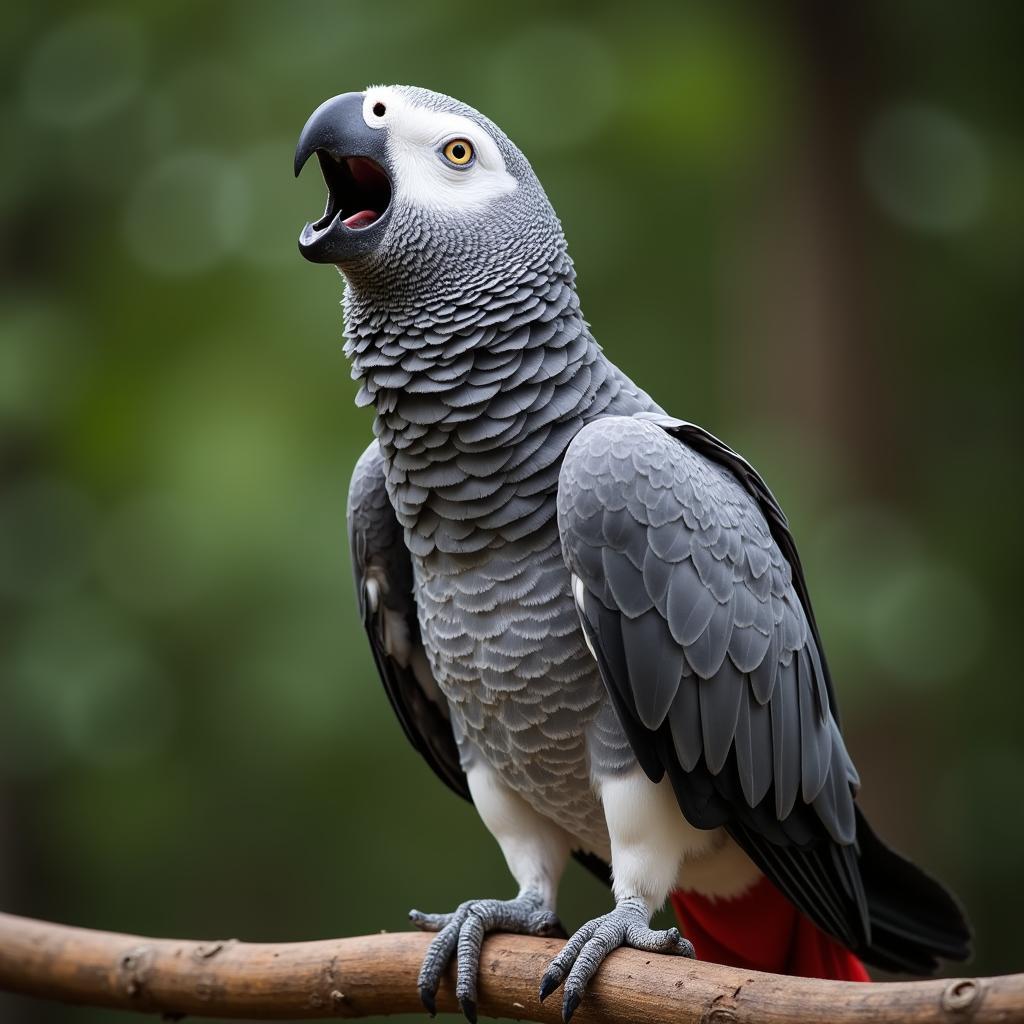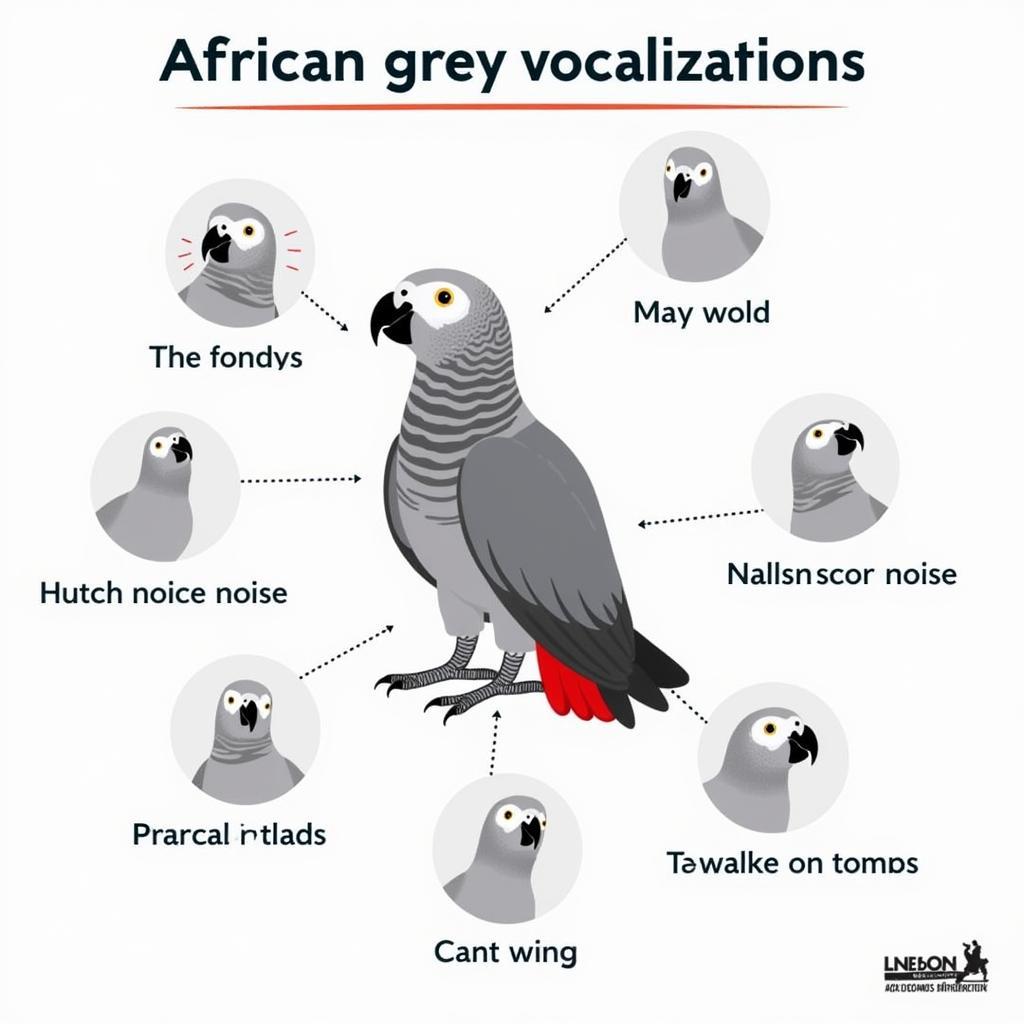Decoding African Grey Noises: A Comprehensive Guide
African Grey Noises are a fascinating aspect of these intelligent birds. From soft chirps to loud calls, understanding their vocalizations can offer a glimpse into their emotional state, needs, and communication style. This comprehensive guide will delve into the world of African grey noises, helping you understand the various sounds they make and their significance.
The Vocal Repertoire of African Greys
African grey parrots are renowned for their exceptional ability to mimic human speech. However, their vocalizations extend far beyond mere imitation. They possess a diverse repertoire of sounds, each carrying its own meaning and purpose.
- Chirps and Whistles: These gentle sounds are often associated with contentment and relaxation. Your feathered companion might chirp softly while preening its feathers or exploring its surroundings.
- Trills and Warbles: These melodious sounds typically indicate a happy and playful mood. Your African grey might trill when it’s excited to see you or anticipating a treat.
- Screeches and Squawks: These loud, harsh sounds are often used to express alarm, fear, or territoriality. A sudden, loud screech might indicate that your parrot is startled or feels threatened.
- Growls and Hisses: These low-pitched sounds are warnings and indicate agitation or aggression. Your parrot might growl if it feels crowded, wants to be left alone, or is protecting its toys.
 African Grey Parrot Vocalizing
African Grey Parrot Vocalizing
Understanding the Context of African Grey Noises
While each type of vocalization has a general meaning, it’s crucial to consider the context to accurately interpret your African grey’s noises. Pay close attention to their body language, environment, and any recent events that might be influencing their behavior.
For instance, a screech accompanied by fluffed feathers and dilated pupils might indicate fear, while a screech with raised wings and a puffed-up chest could signal territoriality. By observing your parrot’s overall demeanor, you can gain a deeper understanding of their emotional state.
Common African Grey Noises and Their Meanings
Let’s explore some common African grey noises and their potential interpretations:
- Beak Clicking: Often a sign of contentment, similar to a cat’s purr. You might also notice beak clicking when your parrot is concentrating on a task, like playing with a toy. For more insights into this behavior, explore our article on African grey beak cracking.
- Soft Mumbling: This gentle sound is usually associated with a relaxed and comfortable state. Your African grey might mumble softly to itself while preening, resting, or playing quietly.
- Contact Calls: These loud, clear calls are used to locate flock members or get your attention. If your African grey feels separated from you, it might use contact calls to re-establish contact.
- Mimicking Sounds: African greys are known for their ability to mimic a wide range of sounds, including household noises, other pets, and even human speech. While mimicking can be entertaining, it’s essential to remember that it’s also a form of communication for them. Delve deeper into the world of African grey parrot sounds to understand the nuances of their mimicry.
 African Grey Parrot Communicating
African Grey Parrot Communicating
Responding to Your African Grey’s Noises
By learning to recognize and interpret your African grey’s noises, you can strengthen your bond and provide a more enriching environment. Here are some tips for responding to your parrot’s vocalizations:
- Positive Reinforcement: Reward desired behaviors with praise, treats, or head scratches. This encourages your parrot to repeat those behaviors.
- Avoid Punishment: Scolding or punishing your parrot for vocalizing will only damage your bond and might lead to behavioral issues. Instead, focus on redirecting their attention to more positive activities.
- Environmental Enrichment: Provide plenty of toys, foraging opportunities, and social interaction to keep your African grey stimulated and entertained. This helps prevent boredom, which can lead to excessive vocalization.
- Consistency and Patience: Be consistent with your training and interactions. Building trust takes time, but with patience and understanding, you can create a harmonious relationship with your African grey.
African Greys: Masters of Communication
Understanding African grey noises meanings is key to unlocking the secrets of these remarkable creatures. By paying close attention to their vocalizations, you can gain valuable insights into their needs, emotions, and overall well-being.
Don’t underestimate the power of communication with your feathered friend. Learn to listen to their noises, interpret their body language, and respond with love and understanding. With time and dedication, you can build an unbreakable bond based on mutual respect and shared communication.
Frequently Asked Questions About African Grey Noises
1. Why does my African grey scream so much?
Excessive screaming can be a sign of boredom, loneliness, fear, or medical issues. It’s important to identify the underlying cause and address it appropriately.
2. What does it mean when my African grey clicks its beak?
Beak clicking is usually a sign of contentment, similar to a cat’s purr. It can also indicate concentration or anticipation.
3. Can African greys learn to talk on the phone?
Yes, African greys can learn to recognize and respond to voices on the phone. To explore this fascinating topic further, check out our article on African grey parrot talking on the phone.
4. How can I get my African grey to stop making a specific noise?
Instead of trying to silence your parrot, focus on redirecting their attention to more desirable behaviors. Provide positive reinforcement for quiet activities and ignore or redirect unwanted vocalizations.
5. Is it normal for African greys to make noises at night?
African greys are generally quiet at night. However, occasional noises might occur due to dreams, changes in their environment, or underlying health concerns.
6. Can body language help me understand my African grey better?
Absolutely! Body language plays a crucial role in understanding your parrot’s emotional state. To learn more about deciphering their non-verbal cues, read our article on African grey body language.
7. What should I do if I’m concerned about my African grey’s noises?
If you’re concerned about your parrot’s vocalizations or any aspect of their behavior, consult with an avian veterinarian.
Need further assistance understanding your African Grey’s language? Contact us at +255768904061, email kaka.mag@gmail.com, or visit us at Mbarali DC Mawindi, Kangaga, Tanzania. Our dedicated team is available 24/7 to provide expert guidance and support.
